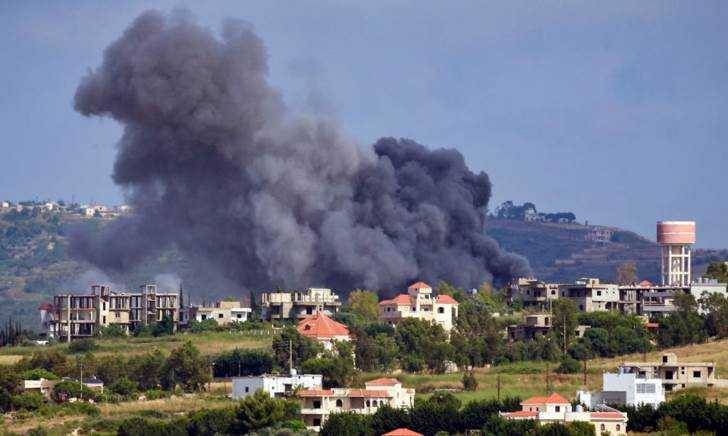The parallel tracks of American and French interest in the Lebanese reality, viewed through the specter of broad war looming over the southern front and the deep pit that the presidential election remains trapped in, highlight the double danger threatening "the land of the cedars." The official authorities are unable to control the course and outcomes of confrontations with Israel, while the prolonged vacancy of the presidency is ruling out multiple internal and regional conflicts, according to the Kuwaiti newspaper "Al-Rai."
It was neither random nor surprising for Lebanon to be a significant topic in the discussions held at the Élysée Palace between French President Emmanuel Macron and American President Joe Biden. They confirmed in their joint statement following the June 8 summit the utmost importance of maintaining Lebanon's stability and reducing tensions along the Blue Line. They will work together toward this goal, calling on all parties to exercise maximum restraint and responsibility, in compliance with UN Security Council Resolution 1701. This was coupled with a strong emphasis on the urgent need to end the long presidential vacancy, which has lasted for 18 months, and to proceed without further delay in electing a new president and forming a government to implement necessary reforms for stabilizing the Lebanese economy, establishing foundations for recovery, and achieving comprehensive economic growth in the country.
Prior to the official statement, Macron emphasized in public remarks that France and the United States would intensify their efforts to prevent the situation from exploding in the Middle East, particularly in Lebanon, stressing the need to reduce tensions between Israel and Hezbollah.
As the joint American-French position is issued, both of whom are part of the "Group of Five" regarding Lebanon, which also includes Saudi Arabia, Egypt, and Qatar, it has been revealed that Macron's personal envoy, Jean-Yves Le Drian, visited the Vatican last Friday to discuss Lebanese issues with Cardinal Parolin, the Vatican Secretary of State, and Monsignor Paul Richard Gallagher, Secretary for Relations with States at the Vatican. This movement indicates a growing dynamic aimed at: first, increasing positive and motivational pressure to avoid an explosion in the region caused by the pressure cooker on the Lebanese-Israeli border, and secondly, preparing the ground for government action in Beirut to meet the aftermath of the Gaza and southern wars through fully constituted authorities that would allow Lebanon to sit as a fully-fledged state at the negotiating table instead of being merely a bargaining chip.
It has become clear that de-escalation on the southern front is as important, if not more critical, than the Gaza war, which has reached its military peak without stopping the disgraceful Israeli crimes against civilians. It stands at the threshold of an American-framed proposal to halt the war that is teetering between Israeli hesitation or denial and Hamas sensing that it has nothing more to lose, making it unwilling to agree to anything less than a guarantee of a permanent cessation of fighting from Tel Aviv and a complete withdrawal from the sector.
Washington no longer hides that keeping the boiling waters—flooding all of Gaza—within the relatively controlled borders of the sector with some regional expansions will not be feasible should the southern front explode. This is assuming that Hezbollah is not Hamas, and its capacity to confront is sufficient to result in symmetry in destruction between Israel and Lebanon, given that the party possesses a significant arsenal of rockets, air defense systems, drones, and updated technologies—either supplied by Iran or developed by its own capabilities—enabling it to achieve a balance or more with what may be the only weapon not exhausted in Tel Aviv: warplanes.
If Hezbollah's operational messages, carried out in response to Israel's persistent air raids, particularly targeting its artillery positions in Zahrani and deploying soldiers around them with Katyusha rocket launchers, are aimed at establishing a deterrent balance against any Israeli thoughts of expanding destructive warfare beyond the Lebanese 8-kilometer strip, then it is noteworthy that Tehran is intent on demonstrating its involvement in any war targeting its strongest arm, Hezbollah.
In this context, Iranian Foreign Minister in an acting capacity, Ali Baqeri Kani, who was in Beirut last week, has emphasized that his country is committed to using its power to establish deterrence against Israel amid the region's unstable conditions. In an interview with Turkish CNN, he responded to a question about the anticipated situation regarding the escalating confrontations between Israel and Hezbollah, stating that they should not forget their defeat in the 33-day war (July 2006). He advised Israelis against repeating the heavy defeat they experienced back then against the axis of resistance.
Regarding any support Iran would provide in the event of a war erupting in northern Israel, Baqeri answered: “We have always supported the axis of resistance against the provocations, crimes, and attempts made by the Israelis. We will continue to support them from now on.”
As Israeli Prime Minister Benjamin Netanyahu announced yesterday that they need to eliminate the threat of Hamas and Hezbollah and avoid political interests, it was highlighted in the newspaper "Israel Hayom" that the Israeli leadership fears Hezbollah. This fear extends to the entire public and prevents any capacity for logical and wise thinking outside the box, noting that the fire in the north has not stopped for a moment, being fiercer and deadlier than ever. The political and military leaderships are only making futile statements and threats that no one takes seriously anymore, either here or in Lebanon, according to "Al-Rai."




